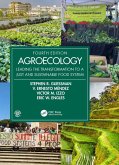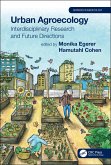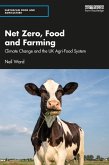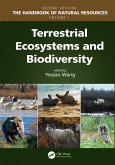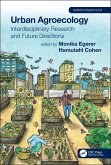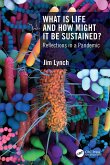Stephen R. Gliessman, V. Ernesto Méndez, Victor M. Izzo, Eric W. Engles
Agroecology (eBook, PDF)
Leading the Transformation to a Just and Sustainable Food System
91,95 €
91,95 €
inkl. MwSt.
Sofort per Download lieferbar

46 °P sammeln
91,95 €
Als Download kaufen

91,95 €
inkl. MwSt.
Sofort per Download lieferbar

46 °P sammeln
Jetzt verschenken
Alle Infos zum eBook verschenken
91,95 €
inkl. MwSt.
Sofort per Download lieferbar
Alle Infos zum eBook verschenken

46 °P sammeln
Stephen R. Gliessman, V. Ernesto Méndez, Victor M. Izzo, Eric W. Engles
Agroecology (eBook, PDF)
Leading the Transformation to a Just and Sustainable Food System
- Format: PDF
- Merkliste
- Auf die Merkliste
- Bewerten Bewerten
- Teilen
- Produkt teilen
- Produkterinnerung
- Produkterinnerung

Bitte loggen Sie sich zunächst in Ihr Kundenkonto ein oder registrieren Sie sich bei
bücher.de, um das eBook-Abo tolino select nutzen zu können.
Hier können Sie sich einloggen
Hier können Sie sich einloggen
Sie sind bereits eingeloggt. Klicken Sie auf 2. tolino select Abo, um fortzufahren.

Bitte loggen Sie sich zunächst in Ihr Kundenkonto ein oder registrieren Sie sich bei bücher.de, um das eBook-Abo tolino select nutzen zu können.
This bestselling textbook provides the essential foundation for understanding sustainability in all its components. The fourth edition of Agroecology encourages students and practitioners to consider the critical importance of transitioning to a new paradigm for food and agriculture, and what this means for our future.
- Geräte: PC
- mit Kopierschutz
- eBook Hilfe
Andere Kunden interessierten sich auch für
![Agroecology (eBook, ePUB) Agroecology (eBook, ePUB)]() Stephen R. GliessmanAgroecology (eBook, ePUB)91,95 €
Stephen R. GliessmanAgroecology (eBook, ePUB)91,95 €![Urban Agroecology (eBook, PDF) Urban Agroecology (eBook, PDF)]() Urban Agroecology (eBook, PDF)91,95 €
Urban Agroecology (eBook, PDF)91,95 €![Net Zero, Food and Farming (eBook, PDF) Net Zero, Food and Farming (eBook, PDF)]() Neil WardNet Zero, Food and Farming (eBook, PDF)38,95 €
Neil WardNet Zero, Food and Farming (eBook, PDF)38,95 €![Terrestrial Ecosystems and Biodiversity (eBook, PDF) Terrestrial Ecosystems and Biodiversity (eBook, PDF)]() Terrestrial Ecosystems and Biodiversity (eBook, PDF)49,95 €
Terrestrial Ecosystems and Biodiversity (eBook, PDF)49,95 €![Urban Agroecology (eBook, ePUB) Urban Agroecology (eBook, ePUB)]() Urban Agroecology (eBook, ePUB)91,95 €
Urban Agroecology (eBook, ePUB)91,95 €![What Is Life and How Might It Be Sustained? (eBook, PDF) What Is Life and How Might It Be Sustained? (eBook, PDF)]() Jim LynchWhat Is Life and How Might It Be Sustained? (eBook, PDF)22,95 €
Jim LynchWhat Is Life and How Might It Be Sustained? (eBook, PDF)22,95 €![Landscape Ecology in Agroecosystems Management (eBook, PDF) Landscape Ecology in Agroecosystems Management (eBook, PDF)]() Landscape Ecology in Agroecosystems Management (eBook, PDF)63,95 €
Landscape Ecology in Agroecosystems Management (eBook, PDF)63,95 €-
-
-
This bestselling textbook provides the essential foundation for understanding sustainability in all its components. The fourth edition of Agroecology encourages students and practitioners to consider the critical importance of transitioning to a new paradigm for food and agriculture, and what this means for our future.
Hinweis: Dieser Artikel kann nur an eine deutsche Lieferadresse ausgeliefert werden.
Dieser Download kann aus rechtlichen Gründen nur mit Rechnungsadresse in A, B, BG, CY, CZ, D, DK, EW, E, FIN, F, GR, HR, H, IRL, I, LT, L, LR, M, NL, PL, P, R, S, SLO, SK ausgeliefert werden.
Hinweis: Dieser Artikel kann nur an eine deutsche Lieferadresse ausgeliefert werden.
Produktdetails
- Produktdetails
- Verlag: Taylor & Francis eBooks
- Seitenzahl: 470
- Erscheinungstermin: 30. September 2022
- Englisch
- ISBN-13: 9781000613629
- Artikelnr.: 64281461
- Verlag: Taylor & Francis eBooks
- Seitenzahl: 470
- Erscheinungstermin: 30. September 2022
- Englisch
- ISBN-13: 9781000613629
- Artikelnr.: 64281461
- Herstellerkennzeichnung Die Herstellerinformationen sind derzeit nicht verfügbar.
With graduate degrees in Botany and Ecology from the University of California, Santa Barbara, Stephen (Steve) R. Gliessman has accumulated more than 50 years of teaching, research, and production experience in the field of agroecology. His international experiences in tropical and temperate agriculture, small-farm and large-farm systems, traditional and conventional farm management, hands-on and academic activities, non-profit and business employment, and organic farming have provided a unique combination of experiences and perspectives to incorporate into this book. He was the founding director of the University of California, Santa Cruz, Agroecology Program, one of the first formal agroecology programs in the world, and was the Alfred and Ruth Heller Professor of Agroecology in the Department of Environmental Studies at UCSC until his retirement in 2012. He is the co-founder of the non-profit Community Agroecology Network (CAN) and currently serves on its board of directors. He is the editor of the international journal Agroecology and Sustainable Food Systems and dry farms organic wine grapes and olives with his wife Robbie in northern Santa Barbara County, California.
V. Ernesto Méndez is Professor of Agroecology and Environmental Studies at the University of Vermont's (UVM) Environmental Program and Department of Plant and Soil Science, where he also co-directs the Agroecology and Livelihoods Collaborative (ALC) with Martha Caswell. With degrees in Crop Science, Tropical Agroforestry, and Agroecology, he focuses his research and teaching on agroecology, agri-food systems, participatory action research (PAR), coffee agroecology, transdisciplinary research approaches, and social justice. At UVM he is also a faculty member of the Food Systems Graduate Program, fellow and steering committee member of the Gund Institute for Environment. He has more than 25 years of experience working with smallholder farmers and Indigenous communities in Latin America and collaborating in agroecology efforts across the world. He has authored or co-authored more than 60 peer-reviewed articles and chapters and edited three books. Ernesto was born and raised in El Salvador and maintains deep connections, in life and work, with his Central American roots.
Victor M. Izzo is an agricultural entomologist and Lecturer of Agroecology and Environmental Studies in the Plant and Soil Science Department and Environmental Program at the University of Vermont. He also serves as the Education Coordinator of the Agroecology and Livelihoods Collaborative (ALC) and is the co-founder of the Vermont Entomology and Participatory Action Research Team (VEPART), also housed within the Department of Plant and Soil Science. With degrees in Chemistry, Bioscience, and Plant and Soil Science, Vic brings a broad perspective to his work as an agroecologist and teacher. Whether it is a high school classroom in Mexico City, a Master Gardener workshop on a New England farm, or an agroecology course on a university campus, he is always looking to create innovative learning communities built on trust, empathy, and the co-production of knowledge. When he is not in a classroom or on a farm, Vic is with his partner Carolina and son Nico tending to their many gardens and indulging in their respective culinary traditions of Italy and Mexico.
Eric W. Engles is a freelance editor, independent scholar, photographer, and naturalist. With experience in the natural sciences, a graduate degree in Sociology, and recognized achievement in the arts, he has developmentally edited more than two dozen books published by academic presses in fields ranging from environment and history to art and behavioral sciences. He has always tended a home garden, and the current two-decade gardening endeavor, in the foothills of the Sierra Nevada, supplies him and his wife Lisa with much of their food.
V. Ernesto Méndez is Professor of Agroecology and Environmental Studies at the University of Vermont's (UVM) Environmental Program and Department of Plant and Soil Science, where he also co-directs the Agroecology and Livelihoods Collaborative (ALC) with Martha Caswell. With degrees in Crop Science, Tropical Agroforestry, and Agroecology, he focuses his research and teaching on agroecology, agri-food systems, participatory action research (PAR), coffee agroecology, transdisciplinary research approaches, and social justice. At UVM he is also a faculty member of the Food Systems Graduate Program, fellow and steering committee member of the Gund Institute for Environment. He has more than 25 years of experience working with smallholder farmers and Indigenous communities in Latin America and collaborating in agroecology efforts across the world. He has authored or co-authored more than 60 peer-reviewed articles and chapters and edited three books. Ernesto was born and raised in El Salvador and maintains deep connections, in life and work, with his Central American roots.
Victor M. Izzo is an agricultural entomologist and Lecturer of Agroecology and Environmental Studies in the Plant and Soil Science Department and Environmental Program at the University of Vermont. He also serves as the Education Coordinator of the Agroecology and Livelihoods Collaborative (ALC) and is the co-founder of the Vermont Entomology and Participatory Action Research Team (VEPART), also housed within the Department of Plant and Soil Science. With degrees in Chemistry, Bioscience, and Plant and Soil Science, Vic brings a broad perspective to his work as an agroecologist and teacher. Whether it is a high school classroom in Mexico City, a Master Gardener workshop on a New England farm, or an agroecology course on a university campus, he is always looking to create innovative learning communities built on trust, empathy, and the co-production of knowledge. When he is not in a classroom or on a farm, Vic is with his partner Carolina and son Nico tending to their many gardens and indulging in their respective culinary traditions of Italy and Mexico.
Eric W. Engles is a freelance editor, independent scholar, photographer, and naturalist. With experience in the natural sciences, a graduate degree in Sociology, and recognized achievement in the arts, he has developmentally edited more than two dozen books published by academic presses in fields ranging from environment and history to art and behavioral sciences. He has always tended a home garden, and the current two-decade gardening endeavor, in the foothills of the Sierra Nevada, supplies him and his wife Lisa with much of their food.
Foreword Preface 1 Preface 2 Authors Recommendations for Using this Textbook Section I
Pathway to Agroecology 1 The Case for Fundamental Change in Agriculture 2 Alternatives to Industrial Agriculture 3 The Agroecosystem Concept Section II
Agricultural Organisms and their Environment 4 The Plant: Nutrition, Growth, and Response to the Environment 5 Light 6 Climatic Factors Affecting Plants 7 Biotic Factors and Interactions among Organisms 8 The Soil Ecosystem 9 The Environmental Complex Section III
System-Level Interactions 10 Population Ecology of Agroecosystems 11 Genetic Resources in Agroecosystems 12 Species Interactions in Crop Communities 13 Agroecosystem Diversity 14 Ecological Pest, Weed, and Disease Management 15 Successional Development and Agroforestry 16 Animals in Agroecosystems 17 Energetics of Agroecosystems 18 Landscape Diversity Section IV
Agroecological Farms and Communities 19 Sustainability and Its Assessment 20 Converting Farms to Ecologically Based Management 21 Bringing Farmers and Consumers Closer Together 22 Urban and Peri-urban Agriculture Section V
Transforming the Global Food System 23 Achieving a Just and Sustainable Food System 24 Economic Dynamics of the Food System 25 Agriculture and the Climate Crisis 26 Shaping the Future in the Present Glossary References Index
Pathway to Agroecology 1 The Case for Fundamental Change in Agriculture 2 Alternatives to Industrial Agriculture 3 The Agroecosystem Concept Section II
Agricultural Organisms and their Environment 4 The Plant: Nutrition, Growth, and Response to the Environment 5 Light 6 Climatic Factors Affecting Plants 7 Biotic Factors and Interactions among Organisms 8 The Soil Ecosystem 9 The Environmental Complex Section III
System-Level Interactions 10 Population Ecology of Agroecosystems 11 Genetic Resources in Agroecosystems 12 Species Interactions in Crop Communities 13 Agroecosystem Diversity 14 Ecological Pest, Weed, and Disease Management 15 Successional Development and Agroforestry 16 Animals in Agroecosystems 17 Energetics of Agroecosystems 18 Landscape Diversity Section IV
Agroecological Farms and Communities 19 Sustainability and Its Assessment 20 Converting Farms to Ecologically Based Management 21 Bringing Farmers and Consumers Closer Together 22 Urban and Peri-urban Agriculture Section V
Transforming the Global Food System 23 Achieving a Just and Sustainable Food System 24 Economic Dynamics of the Food System 25 Agriculture and the Climate Crisis 26 Shaping the Future in the Present Glossary References Index
Foreword Preface 1 Preface 2 Authors Recommendations for Using this Textbook Section I
Pathway to Agroecology 1 The Case for Fundamental Change in Agriculture 2 Alternatives to Industrial Agriculture 3 The Agroecosystem Concept Section II
Agricultural Organisms and their Environment 4 The Plant: Nutrition, Growth, and Response to the Environment 5 Light 6 Climatic Factors Affecting Plants 7 Biotic Factors and Interactions among Organisms 8 The Soil Ecosystem 9 The Environmental Complex Section III
System-Level Interactions 10 Population Ecology of Agroecosystems 11 Genetic Resources in Agroecosystems 12 Species Interactions in Crop Communities 13 Agroecosystem Diversity 14 Ecological Pest, Weed, and Disease Management 15 Successional Development and Agroforestry 16 Animals in Agroecosystems 17 Energetics of Agroecosystems 18 Landscape Diversity Section IV
Agroecological Farms and Communities 19 Sustainability and Its Assessment 20 Converting Farms to Ecologically Based Management 21 Bringing Farmers and Consumers Closer Together 22 Urban and Peri-urban Agriculture Section V
Transforming the Global Food System 23 Achieving a Just and Sustainable Food System 24 Economic Dynamics of the Food System 25 Agriculture and the Climate Crisis 26 Shaping the Future in the Present Glossary References Index
Pathway to Agroecology 1 The Case for Fundamental Change in Agriculture 2 Alternatives to Industrial Agriculture 3 The Agroecosystem Concept Section II
Agricultural Organisms and their Environment 4 The Plant: Nutrition, Growth, and Response to the Environment 5 Light 6 Climatic Factors Affecting Plants 7 Biotic Factors and Interactions among Organisms 8 The Soil Ecosystem 9 The Environmental Complex Section III
System-Level Interactions 10 Population Ecology of Agroecosystems 11 Genetic Resources in Agroecosystems 12 Species Interactions in Crop Communities 13 Agroecosystem Diversity 14 Ecological Pest, Weed, and Disease Management 15 Successional Development and Agroforestry 16 Animals in Agroecosystems 17 Energetics of Agroecosystems 18 Landscape Diversity Section IV
Agroecological Farms and Communities 19 Sustainability and Its Assessment 20 Converting Farms to Ecologically Based Management 21 Bringing Farmers and Consumers Closer Together 22 Urban and Peri-urban Agriculture Section V
Transforming the Global Food System 23 Achieving a Just and Sustainable Food System 24 Economic Dynamics of the Food System 25 Agriculture and the Climate Crisis 26 Shaping the Future in the Present Glossary References Index

